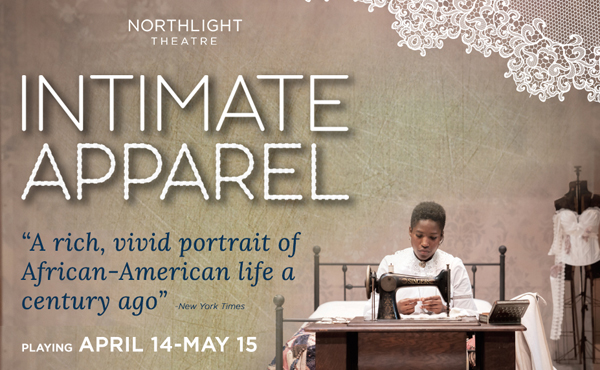
[rating=4]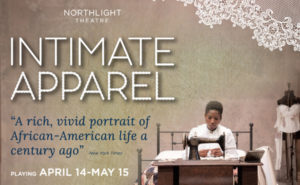 All of us have our dreams and ambitions for which we may sacrifice time, money, and even our own self-worth to accomplish. Such is the theme behind “Intimate Apparel”, a sad but very real tale about people who long for some amount of freedom from the constraints of society, yearn for income and some measure of economic success, and seek some measure of dignity and respect from others. Written by Lynn Nottage and adeptly directed by Tasia A. Jones, “Intimate Apparel” meticulously, slowly, and effectively tells an interesting story from 1905, a time when the racial and religious divide in the United States meant that African-Americans, Jews, and those of other minority groups were heavily discriminated against; it was also when women had not yet gotten the vote and were treated as second-class citizens.
All of us have our dreams and ambitions for which we may sacrifice time, money, and even our own self-worth to accomplish. Such is the theme behind “Intimate Apparel”, a sad but very real tale about people who long for some amount of freedom from the constraints of society, yearn for income and some measure of economic success, and seek some measure of dignity and respect from others. Written by Lynn Nottage and adeptly directed by Tasia A. Jones, “Intimate Apparel” meticulously, slowly, and effectively tells an interesting story from 1905, a time when the racial and religious divide in the United States meant that African-Americans, Jews, and those of other minority groups were heavily discriminated against; it was also when women had not yet gotten the vote and were treated as second-class citizens.
We follow the life of Esther Mills (Mildred Marie Langford), a black woman, originally from the South, who has been living in New York City for the last eighteen years. While rooming at an all-woman’s boardinghouse, run by the middle-aged and divorced Mrs. Dickson (Felicia P. Fields), she learned a trade from an elderly resident: that of being a seamstress, so that she could earn her own money in a respectable way. Esther’s particular niche is in making undergarments and sexy underwear for wealthy white women (who want to keep their husbands interested in them) and for black prostitutes. And that is how she became acquainted with a wealthy white woman named Mrs. Van Buren (Rebecca Spence) as well as her close friend Mayme (Rashada Dawan), who works as a “lady of the evening” and plays piano at a brothel. Always seeking to better herself, Esther wants to acquire enough money to own her own beauty shop. She also desires to become respectable at church and in black society as a whole and fears becoming a spinster; therefore, she wants to be married. But what man would have a woman who is already 35 years old?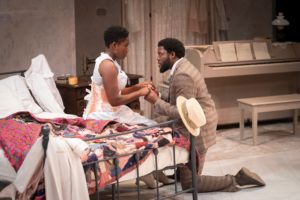
In the process of exchanging a series of letters with her pen pal George Armstrong (Yao Dogbe), a construction worker who lives in Panama, she decides that she is in love with him. And he subsequently travels to New York for the purpose of marriage. What initially doesn’t seem like a problem soon becomes one. Because Esther is illiterate, she hasn’t written the love letters herself: instead, she gets Mrs. Van Buren to write George back, followed by getting Mayme to continue the correspondence. One day when Esther receives one of her letters from George, mailed to the boardinghouse, Mrs. Dickson is immediately suspicious of him and his intentions. “You will thank me,” she says to Esther as she tears up the letter. Yet since Esther and George are both in love with the idea of being married, they seek each other’s warm embrace, sight unseen.
But once they are already married to each other and tell one another their dreams, they soon come to realize that their expectations for the future are very different. Esther understands beautiful things. To express her fondness for George on their wedding night, she makes him a special gift: a gorgeous jacket out of Japanese silk. She later purchases expensive Scottish wool and makes a lovely suit for him. He, on the other hand, understands construction work and physical activity. His dream is to own a stable of draft horses. But his move to New York seems to have put him behind the proverbial eight ball when it comes to earning a living. As a black man, he cannot find a good-paying job in his trade. Potential employers call him “boy” and give available jobs to white men who are less experienced than he is. When he cannot suffer the humiliation of not being able to find suitable employment, he becomes resentful that his wife has more money than he does—for, in his way of thinking, the measure of a man is the amount of money he can bring into the household. George wants to be a “big shot” on his own merits; but short of that, he pretends to be one so as to soothe his own ego.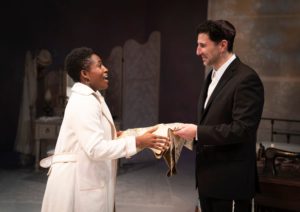
Esther often goes to purchase clothing material from Mr. Marks, an Orthodox Jewish man (Sean Fortunato), who works out of his apartment. He carries gorgeous expensive fabrics. “How soft the material is to the touch!” one might say to the other. It is clear that some of their banter about cloth is meant suggestively (although each would deny it); it demonstrates a fondness that they have for one another as they both share an appreciation for fine cloth and lace. But because of their differing skin colors and religious backgrounds, any type of intimate relationship between them would be forbidden within both of their communities. And besides, Mr. Marks is already pledged to some woman he’s never seen back in Romania, where he is originally from. His betrothal has already been arranged by his family, but it is quite clear that he is not very anxious to marry. One can infer that he may have come to the United States to escape some amount of restrictions on his life in “the Old Country.”
While there is a certain amount of predictability to this show, some aspects are a surprise, and this, among other things, is what makes “Intimate Apparel” such a marvelous play to watch! By means of their fine acting, the whole cast creates believable characters. The multipurpose set, designed by Scott Penner, contributes to the ambiance of the show and allows for Jones’s fluid directing. At one moment, we are in Esther’s room and at the next we are in Mayme’s room and at the next we are in Mr. Marks’s apartment, all using the same scenic design and props. Lighting design by Claire Chrzan and sound design by Jeffrey Levin are exactly what they should be. The standout crew member, however, is Raquel Adorno, who made the magnificent costumes for this show. What a wonder to see the meticulous detail on her handcrafted corsets as well as the range of male and female costumes that she designed and created. These are all so exquisite and make the production! Each one of these garments and undergarments is appropriate for the time period and essential to tell this story in just the right way. Without these costumes, there would be no show.
Throughout her working life, Esther has stitched the money she’s been saving over the years into a crazy quilt on her bed. However, after the mishap of marrying the wrong man, she is forced to start over from the very beginning, sewing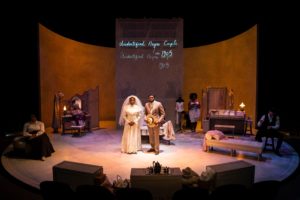 her crazy quilt all over again. The symbolism of this act is that she has not given up her dreams, even if they may appear crazy to some. This second time around, however, she has become more like Mrs. Dickson: She can work hard to accomplish her goals without the need to rely on a man. Esther is no longer the anonymous black seamstress but has now made a name for herself. She can append George’s last name to hers and remain “Mrs. Armstrong” for the rest of her life. Just by the sheer act of having been married, she can now gain some measure of independence and respectability within the African-American community. At the same time, she becomes stronger in character, because she now knows that she can achieve her goals on her own. Yet Esther’s struggles continue as with women and all people of color from that era (and well into ours).
her crazy quilt all over again. The symbolism of this act is that she has not given up her dreams, even if they may appear crazy to some. This second time around, however, she has become more like Mrs. Dickson: She can work hard to accomplish her goals without the need to rely on a man. Esther is no longer the anonymous black seamstress but has now made a name for herself. She can append George’s last name to hers and remain “Mrs. Armstrong” for the rest of her life. Just by the sheer act of having been married, she can now gain some measure of independence and respectability within the African-American community. At the same time, she becomes stronger in character, because she now knows that she can achieve her goals on her own. Yet Esther’s struggles continue as with women and all people of color from that era (and well into ours).
This brief summary is not a spoiler alert! There are so many aspects to the story and so many components to this production that are so lovingly done. What we see is how beautifully this show is stitched together. And it is one that you should definitely watch!
Northlight Theatre’s production of “Intimate Apparel” is running through May 15, 2022, at the North Shore Center for the Performing Arts, 9501 Skokie Boulevard, in Skokie.
Tickets are $30-$89.
Student tickets are $15, depending on availability.
Performance schedule:
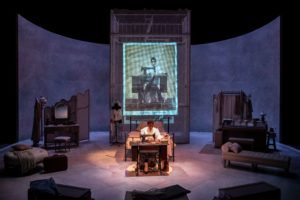 Wednesdays – 1:00 p.m. and 7:30 p.m.
Wednesdays – 1:00 p.m. and 7:30 p.m.
Thursdays – 7:30 p.m.
Fridays – 8:00 p.m.
Saturdays – 2:30 p.m. and 8:00 p.m.
Sundays – 2:30 p.m.
Additional shows:
Tuesday, May 3 – 7:30 p.m.
Sunday, May 15 – 7:00 p.m.
A relaxed performance for individuals with sensory sensitivity will be held Wednesday, May 4th at 7:30 p.m.
An open captioning and audio described performance will be held on Saturday, May 7th at 2:30 p.m.
To purchase tickets, go to https://northlight.org/events/intimate-apparel/ or phone the box office at 847-673-6300 or in person at 9501 Skokie Blvd., in Skokie. You can also go to:
https://northshorecenter.org/events-tickets/residents-companies/.
Group discounts to Northlight Theatre are available for groups of 10 or more by calling 847-324-1233.
Northlight Theatre is a resident company of the North Shore Center for the Performing Arts. To learn more about the theatre company and their future offerings, visit: https://northlight.org/.
To learn more about the North Shore Center for the Performing Arts and the various shows that are available at that venue, go to: https://northshorecenter.org/.
The North Shore Center for the Performing Arts is taking part in a unified policy requiring patrons to present proof of full COVID-19 vaccination and an identification card. Properly worn face masks are required for all patrons regardless of vaccination status inside the theatre.
To see what others are saying, visit www.theatreinchicago.com, go to Review Round-Up and click at “Intimate Apparel”.






More Stories
“Mary Poppins : A Staged Concert” reviewed by Julia W. Rath
” I and You”
“Johnny Cobweb” reviewed by Mark Reinecke